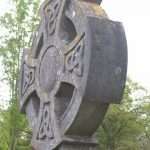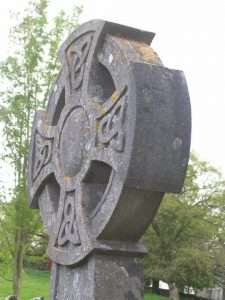Sermon for Sunday, 11th September 2016 (Trinity 16/Ordinary 24)
“The fool has said in his heart, ‘There is no God.”. Psalm 14:1
The opening words of this week’s psalm are troubling. A fool may indeed say there is no God, but many of the wise and intelligent in our world would concur with the fool’s opinion. It is no longer sufficient to simply repeat texts, the Bible says we must be able to explain why we disagree with the fool, in the First Letter of Peter Chapter 3 Verse 15 we are told, “Always be ready to make your defence to anyone who demands from you an account of the hope that is in you.”
Do we believe that there is a God? If we do, how do we explain our belief? How do we try to persuade people living in a scientific age that the God revealed to us in the Bible is relevant to them today? The people we meet probably break down into three main groups.
The first group is those who neither believe in God nor belong to the church. They take the view that science has eliminated any possibility of believing in God in any real sense. People might be agnostic rather than atheist, accepting that it’s possible that there’s something out there, but even if they accept that there might be something, they don’t believe that something makes any difference to our world or our lives. As they don’t believe in “God”, or whatever we might call him, they would think it illogical to attend a church service to offer worship to something they don’t believe exists. They are consistent—they act as they believe.
The second group, which is probably much bigger than we think, are those who still belong but no longer believe. We all know people who might still regard themselves as “Christians” and might still even attend church, but they don’t really believe that God makes any difference to their lives or to the world in which they live. I think there are many people who come along at occasions like Christmas who, if they put their hand on their heart, would say that they didn’t think that the stuff that was talked about in church really made an difference to what went on in their ordinary lives. Christianity is part of their heritage, part of the life of their community, but, being honest, it’s not something to which they would be prepared to commit themselves.
The third group, which I think would include ourselves, is those who believe and belong, but it’s not an easy position to hold. If we want to be open to all the scientific learning in our world, we have to say “where does God fit in?” How do we say that we disagree with the fool?
Chris Stillman, Emeritus Professor of Geology at Trinity College, Dublin, a member of the choir in my last parish, once gave me a story that helped me in my thinking about how God and our scientific views fit together.
“Justin Barrett, something of an “experimental theologist”, asked a group of Christians to imagine various situations in which they might have to pray to God to save others from danger – for example:
A ship is sinking on the high seas.
The subjects are offered the choice of deciding whether God would:
(a) help the ship to stay afloat
(b) give the passengers strength to stay afloat in the freezing waters
(c) influence the mind of a captain of a nearby ship to come and rescue them.
The subjects overwhelmingly voted for option (c).
The people in Barrett’s study had a counter-intuitive notion of God being all-powerful, (our human intuition or “gut-feeling” doesn’t suggest such a thing is likely, but we believe it nonetheless) —but they also considered him more likely to change someone’s mind – a very human strategy – than to intervene in physics or biology”.
Justin Barrett’s work helps us think about where it is that we find God—it is working in people’s hearts and minds.
When we look at our universe, science gives us a comprehensive explanation of how things have happened, how things came to be as they are; what science never does is explain why, science is not about meaning and purpose. Scientific methods are about testing theories that purport to explain physical processes, if the theory explains what happens then it becomes part of our scientific knowledge, if it does not, it is discarded and research continues. Science does not give grounds for us to say that the fool was right in saying there is no God.
I believe the fool is wrong because, whether we believe and belong or neither believe nor belong, there are whole areas of our lives which cannot be explained in scientific terms, which are about thoughts and feelings and about searching for purposes and meanings.
If the fool is right, then how do we answer all the questions that ask why things are as they are? How do we answer questions about what meaning there is in a universe if we say there is no God? The honest answer would be that without a belief in God, the universe and life are without any meaning other than what people make up for themselves.
Secondly, if the fool is right, how do we explain the way that our society has developed? Why are we a society where it is expected that the weak and the vulnerable receive care? Scientifically, it would make more sense for the strong to be allowed to thrive and for the weak to be culled—isn’t that the way we keep livestock? If the fool is right, then how did humanity develop as it did? How is it that a world developed where human dignity became important and where human rights were to be upheld? In terms of plain physical science, it is not logical to do things in this way, so why do we do it? Even things like human rights become difficult to define if there is no religious belief. There are no such things as “natural rights”, no rights that can be proven using scientific methods. You cannot put someone on the operating table and locate their human rights; even things we take for granted, like respect for a person’s life and for their property, can only exist if we accept that there is more to life than what science can explain. I believe that being able to explain civilisation, being able to explain the way we treat each other, requires that the fool must be wrong.
Meaning in the universe, rights for human beings; both these point to someone beyond, someone who is the author of these thoughts, someone who prompts us to become the people we are.
The third area we might think about is individual feelings. How, if the fool is right, would we explain a whole range of individual feelings? Why do we enjoy music? Why do we enjoy art? Why can watching a film move us to tears? Physical science cannot explain feelings that do not have rational sources. Even our enthusiasm for sports teams: what difference does it make whether a team win or lose? None, yet it matters a great deal to many, many people. How do we explain feelings that serve no scientific purpose if we are merely the outcome of scientific processes?
It is not even a matter of nurture. Why do people from similar backgrounds, with similar upbringings and living in similar circumstances so often differ greatly on their opinions and tastes? Shouldn’t people experiencing similar nurture have similar views? Bring together any group of teenagers who have grown up together in a neighbourhood, and see how different they are in their views.
The most illogical feeling of all is love—love is without a scientific explanation, particularly our care for those who can offer us nothing in return. Christians believe that God is the source of love. If the fool is right, how does someone explain love?
While many wise and intelligent may agree with him, the fool must be wrong because without a God there are no answers to questions about our universe, no answers about why a society should be organised in a particular way, no answers as to why we feel the way we do.
“The fool has said in his heart, ‘There is no God.”



What an excellent address! However I am uncomfortable with the words in the penultimate paragraph “particularly our care for those who can offer us nothing in return”. If this is about altruistic love that is fine, but it is not true love if we do not also acknowledge the unique giftedness and desire to give love back of those we care for.
Point taken.
As my bishop would comment, “an infelicitous phrase.”